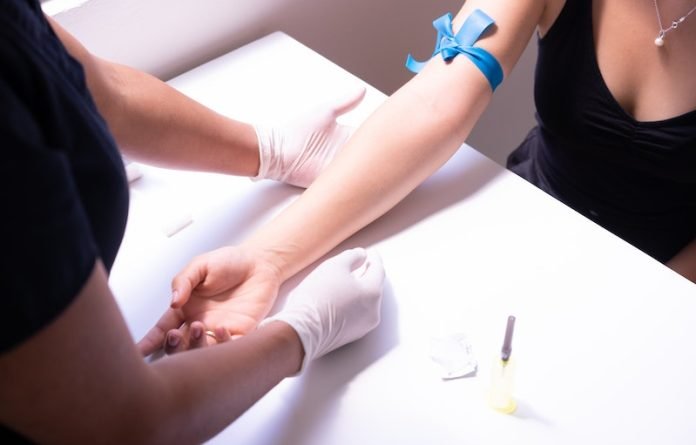
Scientists at Columbia University are researching blood tests that, when used with memory tests, could help identify Alzheimer’s disease accurately in low-resource areas that lack specialists or brain imaging machines.
Biomarkers in spinal fluid can confirm the diagnosis, but patients may not be willing to undergo a lumbar puncture to remove the cerebrospinal fluid.
In recent years, blood-based biomarkers have been discovered that are almost as reliable as those in spinal fluid in identifying people with Alzheimer’s disease.
However, few studies have been done to see if these tests could identify individuals with Alzheimer’s disease in low-resource areas.
In a new study, Columbia researchers worked with local doctors and recruited 746 older adults, averaging 71 years old, from the Dominican Republic and northern Manhattan’s Dominican community.
Each participant underwent detailed neurological and cognitive testing, and blood samples were taken to measure blood-based biomarkers for Alzheimer’s disease.
The researchers analyzed the results to determine if participants had Alzheimer’s disease, other types of dementia, or normal cognitive aging.
Just over 20% of the participants were given a clinical diagnosis of Alzheimer’s disease.
The blood tests revealed that these individuals also had higher levels of Alzheimer’s biomarkers, including phosphorylated tau, neurofilament light chain, and glial fibrillary acidic protein.
The blood tests could also identify the earliest biological signs of Alzheimer’s disease before the onset of symptoms in about 20% of participants who were not diagnosed with the disease based on their performance on memory and cognitive tests.
The study shows that blood tests may be a sensitive indicator of preclinical Alzheimer’s disease, which could benefit people as more preventive strategies become available.
The team said that developing an accurate blood test is essential in identifying people who could benefit from treatment, especially those who lack access to advanced diagnostic tools.
Although more research is required to determine how blood-based biomarker tests can be used in the clinic, the tests are not currently available outside of research studies.
How to detect Alzheimer’s disease early
Alzheimer’s disease is a type of dementia that affects memory, thinking, and behavior.
Early detection of Alzheimer’s disease can help people receive proper treatment and care, as well as provide an opportunity to plan for the future. Here are some ways to detect Alzheimer’s disease early:
Memory and cognitive tests: Doctors may use a series of memory and cognitive tests to determine if someone is experiencing symptoms of Alzheimer’s disease.
These tests can assess language skills, problem-solving abilities, attention span, and memory. These tests are typically conducted in a clinical setting and can help detect early symptoms of the disease.
Brain imaging: Brain imaging techniques, such as magnetic resonance imaging (MRI) or positron emission tomography (PET) scans, can help detect changes in the brain that may be associated with Alzheimer’s disease.
These changes may include the accumulation of abnormal protein deposits, such as amyloid and tau proteins, which are believed to contribute to the development of the disease.
Blood tests: Blood tests are a less invasive way to detect early signs of Alzheimer’s disease.
Researchers are investigating blood-based biomarkers that may identify people with Alzheimer’s disease or those who are at risk of developing the disease.
These biomarkers may include proteins or other substances that are associated with Alzheimer’s disease.
Genetic testing: Genetic testing can help identify individuals who are at risk of developing Alzheimer’s disease.
Some genes are associated with an increased risk of developing the disease, including the APOE gene. However, genetic testing is not recommended for everyone and should be done with the guidance of a healthcare provider.
Self-awareness: Individuals who are experiencing memory problems or other symptoms of Alzheimer’s disease can monitor their own symptoms and discuss them with their healthcare provider.
Being aware of changes in memory or thinking abilities can help individuals receive an early diagnosis and begin treatment.
Early detection of Alzheimer’s disease can help people receive proper treatment and care, as well as provide an opportunity to plan for the future.
If you or a loved one are experiencing memory problems or other symptoms of Alzheimer’s disease, it is important to talk to a healthcare provider to discuss appropriate testing and treatment options.
If you care about brain health, please read studies about how the Mediterranean diet could protect your brain health, and blueberry supplements may prevent cognitive decline.
For more information about brain health, please see recent studies about diabetes drug that may also help prevent Alzheimer’s, and Alzheimer’s is linked to gum disease – but bad oral health is not the only culprit.
The study was conducted by Lawrence S. Honig et al and published in JAMA Network Open.
Copyright © 2023 Knowridge Science Report. All rights reserved.



